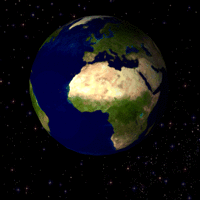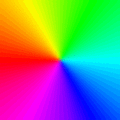Graphics Interchange Format facts for kids

A rotating globe in GIF format. Posterization is noticeable in the blue gradient areas due to the restricted palette.
|
|
| Filename extension |
.gif
|
|---|---|
| Internet media type |
image/gif
|
| Type code | GIF GIFf |
| Uniform Type Identifier (UTI) | com.compuserve.gif |
| Magic number | GIF87a/GIF89a |
| Developed by | CompuServe |
| Type of format | Raster graphics image format |
The Graphics Interchange Format (often shortened to GIF) is a file format for images.
It is a raster graphics format; that is the image has a fixed size. CompuServe developed and introduced the format in 1987. Today, it is widely used on the World Wide Web.The format supports up to 8 bits per pixel, or 256 colors. It also supports animations. Each frame of an animation can have its own set of 256 colors. GIF is not used to show photographs very much, because having only 256 colors is limiting for such a task.
To reduce their size, images are compressed using Lempel–Ziv–Welch compression. Lempel-Ziv-Welch, or LZW is a lossless compression. No information is lost when compressing or uncompressing. There were some problems with the patent of the LZW compression. That patent was not held by CompuServe, but by Unisys. These issues led to the development of another format, called PNG. This is no longer a problem, because the patents have expired.
Animated GIF

Basic animation was added to the GIF89a spec via the Graphics Control Extension (GCE), which allows various images (frames) in the file to be painted with time delays, forming a video clip. An animated GIF file comprises a number of frames that are displayed in succession, each introduced by its own GCE, which gives the time delay to wait after the frame is drawn. Global information at the start of the file applies by default to all frames. The data is stream-oriented, so the file-offset of the start of each GCE depends on the length of preceding data. Within each frame the LZW-coded image data is arranged in sub-blocks of up to 255 bytes; the size of each sub-block is declared by the byte that precedes it.
By default, however, an animation displays the sequence of frames only once, stopping when the last frame is displayed.
Images for kids
-
A humorous image announcing the launch of a Tumblr account for the White House suggests pronouncing GIF with a hard g.
-
An example of a GIF image saved with a web-safe palette and dithered using the Floyd–Steinberg method. Due to the reduced number of colors in the image, there are display issues.
See also
 In Spanish: Graphics Interchange Format para niños
In Spanish: Graphics Interchange Format para niños





